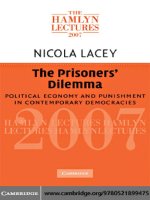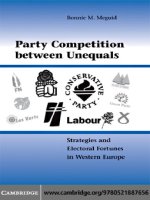0521820596 cambridge university press courts under constraints judges generals and presidents in argentina dec 2004
Bạn đang xem bản rút gọn của tài liệu. Xem và tải ngay bản đầy đủ của tài liệu tại đây (1.77 MB, 243 trang )
This page intentionally left blank
Courts under Constraints
This study offers a new theoretical framework for understanding how institutional instability affects judicial behavior under dictatorship and democracy. In
contrast to conventional wisdom, the central findings of the book challenge the
longstanding assumption that only independent judges rule against the government of the day. Set in the context of Argentina, the study brings together
qualitative case studies and statistical analyses with spatial and game theoretic
models to explore the conditions under which courts rule against the government. In addition to shedding new light on the dynamics of court-executive
relations in Argentina, the study provides general lessons about institutions,
instability, and the rule of law. In the process, the study builds a new set of connections among diverse bodies of scholarship, including U.S. judicial politics,
comparative institutional analysis, positive political theory, and Latin American
politics.
Gretchen Helmke is an assistant professor in Political Science at the University
of Rochester. Her research on comparative institutions and Latin American politics appears in several leading journals, including the American Political Science
Review, Comparative Politics, and Desarollo Econ´omico. Her research has received
grants from the National Science Foundation and the Social Science Research
´ Carlos Nino
Council. She has been a visiting research Fellow at the Fundacion
in Buenos Aires, Argentina; the Kellogg Institute for International Studies at
the University of Notre Dame; and the Weatherhead Center for International
Affairs, Harvard University.
Cambridge Studies in Comparative Politics
General Editor
Margaret Levi University of Washington, Seattle
Assistant General Editor
Stephen Hanson University of Washington, Seattle
Associate Editors
Robert H. Bates Harvard University
Peter Hall Harvard University
Peter Lange Duke University
Helen Milner Columbia University
Frances Rosenbluth Yale University
Susan Stokes University of Chicago
Sidney Tarrow Cornell University
Other Books in the Series
Lisa Baldez, Why Women Protest: Women’s Movements in Chile
Stefano Bartolini, The Political Mobilization of the European Left, 1860–1980:
The Class Cleavage
Mark Beissinger, Nationalist Mobilization and the Collapse of the Soviet State
Nancy Bermeo, ed., Unemployment in the New Europe
Carles Boix, Democracy and Redistribution
Carles Boix, Political Parties, Growth and Equality: Conservative and Social
Democratic Economic Strategies in the World Economy
Catherine Boone, Merchant Capital and the Roots of State Power in Senegal,
1930–1985
Catherine Boone, Political Topographies of the African State: Territorial Authority and Institutional Change
Michael Bratton and Nicolas van de Walle, Democratic Experiments in Africa:
Regime Transitions in Comparative Perspective
Valerie Bunce, Leaving Socialism and Leaving the State: The End of Yugoslavia,
the Soviet Union, and Czechoslovakia
Series list continues following the index.
To My Father and in Memory of My Mother and Grandmother
Courts under Constraints
JUDGES, GENERALS, AND
PRESIDENTS IN ARGENTINA
GRETCHEN HELMKE
University of Rochester
cambridge university press
Cambridge, New York, Melbourne, Madrid, Cape Town, Singapore, São Paulo
Cambridge University Press
The Edinburgh Building, Cambridge cb2 2ru, UK
Published in the United States of America by Cambridge University Press, New York
www.cambridge.org
Information on this title: www.cambridge.org/9780521820592
© Gretchen Helmke 2005
This book is in copyright. Subject to statutory exception and to the provision of
relevant collective licensing agreements, no reproduction of any part may take place
without the written permission of Cambridge University Press.
First published in print format 2005
isbn-13
isbn-10
978-0-511-08160-6 eBook (EBL)
0-511-08160-x eBook (EBL)
isbn-13
isbn-10
978-0-521-82059-2 hardback
0-521-82059-6 hardback
Cambridge University Press has no responsibility for the persistence or accuracy of
urls for external or third-party internet websites referred to in this book, and does not
guarantee that any content on such websites is, or will remain, accurate or appropriate.
Contents
List of Tables
page x
List of Figures
xii
Preface and Acknowledgments
xiii
1
1
1
7
14
RULING AGAINST THE RULERS
1.1 Introduction
1.2 Actors, Institutions, and Mechanisms
1.3 Design and Overview of the Argument
2
THE LOGIC OF STRATEGIC DEFECTION
2.1
2.2
2.3
2.4
2.5
2.6
2.7
3
A THEORY OF COURT-EXECUTIVE RELATIONS:
INSECURE TENURE, INCOMPLETE
INFORMATION, AND STRATEGIC BEHAVIOR
3.1
3.2
3.3
3.4
4
The Standard Strategic Account
A New Pattern of Inter-branch Relations
Modifying the Separation-of-Powers Approach
Judicial Motivations
Problems of Information
Institutions and Sanctioning Players
Conclusion
Politicians and Uncertainty
The Model
Discussion
Conclusion: Testable Hypotheses
JUDGES, GENERALS, AND PRESIDENTS:
INSTITUTIONAL INSECURITY ON THE
ARGENTINE SUPREME COURT, 1976–1999
20
21
24
27
30
34
36
39
41
42
44
49
56
61
vii
Contents
4.1 The Gap between Formal and Informal Institutions
4.2 Judges under the Bayonets: The Military “Proceso,”
1976–1983
4.3 Judges under the Alfons´ın Government: The Return
to Democracy, 1983–1989
4.4 Judges under the First Menem Government: The
Difficulty of Democratic Consolidation
4.5 Judges under the Second Menem Government: The
Path toward Democratic Consolidation?
4.6 Conclusion: An Analytic Narrative of Institutional
Insecurity
5
THE REVERSE LEGAL-POLITICAL CYCLE: AN
ANALYSIS OF DECISION MAKING ON THE
ARGENTINE SUPREME COURT
5.1
5.2
5.3
5.4
5.5
5.6
Data and Methodology
Timing
Importance
Participation
Target of the Threat
Rival Hypotheses: Composition, Legality, and the Mix
of Cases
5.7 Conclusion
6
THE DYNAMICS OF DEFECTION: HUMAN RIGHTS,
CIVIL LIBERTIES, AND PRESIDENTIAL POWER
6.1
6.2
6.3
6.4
6.5
7
The Military Court and Human Rights
The Alfons´ın Court and Human and Civil Rights
The Menem-Era Court and Presidential Power
Conclusion: Did Defection Work?
Epilogue: The Court and the Collapse of Argentina
68
75
84
89
92
98
98
100
105
109
115
118
124
126
127
131
135
141
145
CONCLUSION: BROADER LESSONS AND FUTURE
DIRECTIONS
153
7.1 Strategic Defection and the Reverse Legal-Political
Cycle
7.2 Strategic Defection in Comparative Perspective
7.3 Further Implications, Future Directions
154
158
168
Appendix A Overview of the Federal Argentine Judiciary and
the Argentine Supreme Court
viii
63
175
Contents
Appendix B The Argentine Supreme Court Decisions Data Set
182
Appendix C Equilibria Proofs
189
References
195
Index
209
ix
List of Tables
2.1
3.1
3.2
4.1
4.2
4.3
5.1
5.2
5.3
5.4
5.5
5.6
5.7
x
Four Modes of Inter-branch Relations
page 26
Judges’ and Executives’ Payoffs
45
Equilibria Results
50
Characteristics of Argentine Supreme Court Justices’
Tenure
66
Number of Justices Selected by Each Government,
1862–1995
67
Institutional Insecurity on the Argentine Supreme Court,
1976–1999
96
Individual Supreme Court Justices’ Anti-government Votes
by Time to Transition
103
Number and Percentage of Individual Anti-government
Judicial Decisions by Year in Decree Cases, in Salient
Decree Cases, in Government Appeals Cases, and in Cases
Overturning Second-Instance Court
106
Individual Supreme Court Justices’ Anti-government Votes
by Time to Transition among Decree Cases, Salient Decree
Cases, Government Appeals Cases, and in Cases
Overturning Second-Instance Court
108
Individual Supreme Court Justices’ Abstentions by Time to
Transition
110
Supreme Court’s Appeals Acceptances by Time to
Transition
112
Justices’ Separate Dissents by Time to Transition
114
Subset of Individual Supreme Court Justices’
Anti-government Decisions by Time to Transition among
Tables
Decree Cases, Salient Decree Cases, Abstention,
Pro-government and Anti-government Dissent
5.8 Individual Supreme Court Justices’ Anti-government
Decisions by Time to Transition among Decree Cases,
Salient Decree Cases, Government Appeals Cases, and in
Cases Overturning Second-Instance Court
5.9 The Effects of Transitional Periods under Alfons´ın and
Menem’s Second Government on Decisions in the Second
Instance Compared with the Supreme Court
5.10 Individual Supreme Court Justices’ Anti-government Votes,
Controlling for a Changing Mix of Cases
6.1 Military-Era Supreme Court Justices’ Anti-government
Decisions in Habeas Corpus Cases by Time to Transition
117
120
122
123
129
xi
List of Figures
1.1
2.1
2.2
2.3
3.1
3.2
5.1
xii
The Standard Separation-of-Powers Game
The Executive Selecting and Sanctioning Game
Policy Preferences without Inter-temporal Conflict
Policy Preferences with Inter-temporal Conflict
Court-Executive Signaling Game
Equilibria Predictions
Percentage of Individual Anti-government Judicial
Decisions by Year
page 12
28
29
29
47
55
101
Preface and Acknowledgments
As concern with the rule of law in Latin America and elsewhere continues to grow, this study provides a new framework for understanding how
courts under constraints operate. The assumption that only independent
judges rule against the rulers has long been the accepted wisdom among social scientists, policy makers, and citizens alike. Although this study initially
shared the same premise, it arrives at a markedly different set of conclusions.
Set in the turbulent institutional context of contemporary Argentina, the
book demonstrates that sometimes the very lack of independence provokes
judges to act as a check on their government, including the very government by whom the judges were earlier appointed. I refer to this important,
if heretofore unexamined, phenomenon as strategic defection. In elaborating the specific mechanisms through which this dynamic occurs, the book
challenges a range of classic and contemporary understandings about judicial behavior under conditions of institutional instability and uncertainty. In
addition to solving several theoretical puzzles about court-executive relations in such environments, the study explores the substantive consequences
of this reverse political-legal cycle for elites and citizens in Argentina and
beyond.
At every stage of writing this book, I have benefited immeasurably from
the advice, guidance, and support of others. As a doctoral student at the
University of Chicago, I was extremely fortunate to begin this project under the guidance of my thesis advisers, Susan Stokes, Gerald Rosenberg,
Cass Sunstein, and David Laitin. Susan Stokes was a constant source of
support and inspiration. Gerry Rosenberg provided a wonderful introduction to the field of judicial politics. Cass Sunstein and David Laitin
offered thoughtful comments and advice throughout. Along the way, I
have also received extremely helpful suggestions from many other scholars
xiii
Preface and Acknowledgments
and colleagues, including James Alt, Delia Boylan, Carles Boix, Daniel
Brinks, Greg Caldeira, John Carey, Mark Chaves, Lee Epstein, James
Fearon, John Ferejohn, Barry Friedman, Hein Goemans, Stacia Haynie,
Jonathan Katz, Jack Knight, Steven Levitsky, Scott Mainwaring, Luigi
Manzetti, Gerry Munck, Guillermo O’Donnell, Adam Przeworski, Richard
Snyder, Matthew Stephenson, Georg Vanberg, and Ashutosh Varshney. In
particular, Andy Gould gave encouragement and advice throughout my
dissertation and the early stages of the book project. Participants in diverse fora at the University of Chicago, Harvard University, University of
Michigan, New York University, University of Notre Dame, and University of Washington at St. Louis have also provided provocative questions
and helpful suggestions on most parts of this project. Mark Fey, Daniel
Gingerich, Macartan Humphreys, Luis Fernando Medina, Elena Plaxina,
and Randy Stone provided invaluable advice and suggestions for the formal model contained in Chapter 3. For the final version of the book I am
also deeply indebted to two anonymous reviewers at Cambridge University
Press, to Margaret Levi for her incisive comments and encouragement, and
to Lew Bateman for his support and patience. Whatever errors or insufficiencies remain in the book are entirely my own responsibility.
During my field research in Argentina several people helped to
˜
make this project possible. In particular, I want to thank Carlos Acuna,
Pedro Caballero, Andr´es D’Alessio, Roberto Gargarella, Hern´an Goulco,
Jaime Malamud-Goti, Jonathan Miller, Guillermo Molinelli, and Catalina
Smulovitz, who generously shared their time and insights about Argentine
politics and law. I am grateful to Roberto Frenkel and the Centro de
Estudios del Estado y Sociedad (CEDES) for their generosity, especially
¨
during my pre-dissertation work in August 1996, and to Martin Bohmer
and
´ Carlos Nino. Most of my time in Argentina
Roberto Saba at the Fundacion
was spent in the Palacio de Justicia; I am grateful to the librarians at the
Biblioteca de la Corte Suprema, Dra. Silvina Oubel de Novo and the staff at
the Secretar´ıa de Jurisprudencia, and the staff at the Oficina de Estad´ısticas
and to the many lawyers, judges, and justices in the Tribunales who taught
me about both the formal and informal sides of Argentine law. For his excellent research assistance, I thank Pablo August´ın Lafuente, with whom I
spent many months coding cases in the upper reaches of the seventh-floor
library of the Supreme Court. Above all, I want to thank Mara Rosa Ferino
for her friendship and humor.
Field research in Argentina was made possible by grants from the National Science Foundation Graduate Fellowship (SBR-9617896) and the
xiv
Preface and Acknowledgments
Social Science Research Council International Dissertation Research Fellowship. The Mellon Foundation Final Year Dissertation Fellowship at the
University of Chicago, the Kellogg Institute at the University of Notre
Dame, the Weatherhead Center for International Affairs at Harvard University, and the Lanni Fellowship at the University of Rochester provided
generous support for writing and additional research. For their outstanding research assistance in helping to extend the Argentina Supreme Court
Decisions data set and for sharing their insights about the Argentine judicial system, I am extremely grateful to Maria Eve Miljiker and Santiago
Boccardo. For help preparing the final draft of the manuscript, I would like
to thank Deniz Aksoy, Tugba Guvenc, Ann Marshall, and, most especially,
Elena Plaxina.
Parts of Chapters 2 and 5 have been published in American Political Science
Review under the title, “The Logic of Strategic Defection: Court-Executive
Relations in Argentina under Dictatorship and Democracy” (also translated
and reprinted in Desarollo Econ´omico). Parts of Chapters 2 and 6 have been
published in Comparative Politics under the title, “Checks and Balances by
Other Means: The Argentine Judiciary in the 1990s.”
Throughout this project, I was extremely fortunate to have had the love
and support of my family and friends. Most especially, I am grateful to my
stepmother, Linda; my aunts, Karen and Jan; and to friends Stephanie, Liz,
and Christina. I also want to thank Mitch for his help, humor, and love while
I finished this project. Finally, I want to dedicate this book to my father,
Stephen, for his constant encouragement and support, and to the memory
of my mother, Linda, and grandmother, Nora, who are always with me.
xv
Other Books in the Series (continued from page iii )
Daniele Caramani, The Nationalization of Politics: The Formation of National
Electorates and Party Systems in Western Europe
Kanchan Chandra, Why Ethnic Parties Succeed: Patronage and Ethnic Headcounts in India
Ruth Berins Collier, Paths toward Democracy: The Working Class and Elites in
Western Europe and South America
Donatella della Porta, Social Movements, Political Violence, and the State
Gerald Easter, Reconstructing the State: Personal Networks and Elite Identity
Robert F. Franzese, Macroeconomic Policies of Developed Democracies
Roberto Franzosi, The Puzzle of Strikes: Class and State Strategies in Postwar
Italy
Geoffrey Garrett, Partisan Politics in the Global Economy
Miriam Golden, Heroic Defeats: The Politics of Job Loss
Jeff Goodwin, No Other Way Out: States and Revolutionary Movements
Merilee Serrill Grindle, Changing the State
Anna Gryzymala-Busse, Redeeming the Communist Past: The Regeneration of
Communist Parties in East Central Europe
Frances Hagopian, Traditional Politics and Regime Change in Brazil
J. Rogers Hollingsworth and Robert Boyer, eds., Contemporary Capitalism:
The Embeddedness of Institutions
John D. Huber and Charles R. Shipan, Deliberate Discretion?: The Institutional Foundations of Bureaucratic Autonomy
Ellen Immergut, Health Politics: Interests and Institutions in Western Europe
Torben Iversen, Contested Economic Institutions
Torben Iversen, Jonas Pontusson, and David Soskice, eds., Unions, Employers, and Central Banks: Macroeconomic Coordination and Institutional
Change in Social Market Economies
Thomas Janoski and Alexander M. Hicks, eds., The Comparative Political
Economy of the Welfare State
David C. Kang, Crony Capitalism: Corruption and Capitalism in South Korea
and Philippines
Junko Kato, Regressive Taxation and the Welfare State
Robert O. Keohane and Helen B. Milner, eds., Internationalization and
Domestic Politics
Herbert Kitschelt, The Transformation of European Social Democracy
Herbert Kitschelt, Peter Lange, Gary Marks, and John D. Stephens, eds.,
Continuity and Change in Contemporary Capitalism
Herbert Kitschelt, Zdenka Mansfeldova, Radek Markowski, and Gabor
Toka, Post-Communist Party Systems
David Knokc, Franz Urban Pappi, Jeffrey Broadbent, and Yutaka Tsujinaka,
eds., Comparing Policy Networks
Allan Kornberg and Harold D. Clarke, Citizens and Community: Political
Support in a Representative Democracy
Amie Kreppel, The European Parliament and the Supranational Party System
David D. Laitin, Language Repertories and State Construction in Africa
Fabrice E. Lehoucq and Ivan Molina, Stuffing the Ballot Box: Fraud, Electoral
Reform, and Democratization in Costa Rica
Mark Irving Lichbach and Alan S. Zuckerman, eds., Comparative Politics:
Rationality, Culture, and Structure
Evan Lieberman, Race and Regionalism in the Politics of Taxation in Brazil and
South Africa
Pauline Jones Luong, Institutional Change and Political Continuity in PostSoviet Central Asia: Power, Perception, and Pacts
Doug McAdam, John McCarthy, and Mayer Zald, eds., Comparative Perspectives on Social Movements
James Mahoney and Dietrich Rueschemeyer, eds., Historical Analysis in the
Social Sciences
Scott Mainwaring and Matthew Soberg Shugart, eds., Presidentialism and
Democracy in Latin America
Isabela Mares, The Politics of Social Risk: Business and Welfare State
Development
Anthony W. Marx, Making Race, Making Nations: A Comparison of South
Africa, the United States and Brazil
Joel S. Migdal, State and Society: Studying How States and Societies Constitute
One Another
Joel S. Migdal, Atul Kohli, and Vivienne Shue, eds., State Power and Social
Forces: Domination and Transformation in the Third World
Scott Morgenstern and Benito Nacif, eds., Legislative Politics in Latin
America
Layna Mosley, Global Capital and National Governments
Wolfgang C. Muller and Kaare Strom, Policy, Office, or Votes?
Maria Victoria Murillo, Labor Unions, Partisan Coalitions, and Market Reforms
in Latin America
Ton Notermans, Money, Markets, and the State: Social Democratic Economic
Policies since 1918
Roger Petersen, Understanding Ethnic Violence: Fear, Hatred, and Resentment
in 20th-Century Eastern Europe
Simona Piattoni, ed., Clientelism, Interests, and Democratic Representation
Paul Pierson, Dismantling the Welfare State?: Reagan, Thatcher and the Politics
of Retrenchment
Marino Regini, Uncertain Boundaries: The Social and Political Construction of
European Economics
Lyle Scruggs, Sustaining Abundance: Environmental Performance in Industrial
Democracies
Jeffrey M. Sellers, Governing from Below: Urban Regions and the Global
Economy
Yossi Shain and Juan Linz, eds., Interim Governments and Democratic
Transitions
Beverly J. Silver, Forces of Labor: Worker’s Movements and Globalization since
1870
Theda Skocpol, Social Revolutions in the Modern World
Richard Snyder, Politics after Neoliberalism: Reregulation in Mexico
David Stark and L´aszlo´ Bruszt, Postsocialist Pathways: Transforming Politics
and Property in East Central Europe
Sven Steinmo, Kathleen Thelan, and Frank Longstreth, eds., Structuring
Politics: Historical Institutionalism in Comparative Analysis
Susan C. Stokes, Mandates and Democracy: Neoliberalism by Surprise in Latin
America
Susan C. Stokes, ed., Public Support for Market Reforms in New Democracies
Duane Swank, Global Capital, Political Institutions, and Policy Change in Developed Welfare States
Sidney Tarrow, Power in Movement: Social Movements and Contentious Politics
Ashutosh Varshney, Democracy, Development, and the Countryside
Steven I. Wilkinson, Votes and Violence: Electoral Competition and Ethnic Riots
in India
Elisabeth Jean Wood, Forging Democracy from Below: Insurgent Transitions in
South Africa and El Salvador
Elisabeth Jean Wood, Insurgent Collective Action in El Salvador
1
Ruling against the Rulers
1.1 Introduction
Latin America’s courts are in crisis. Inadequate material resources and infrastructure, outdated procedures, case backlog, corruption, politicization,
and cronyism are among the many problems that judiciaries face. Although
such difficulties are hardly new to the region, over the last decade the image
of the judiciary has grown decidedly worse. According to a recent survey
published in The Economist, the percentage of Latin American citizens that
has confidence in the judiciary has fallen from approximately 35 percent in
1996 to around 20 percent in 2003. In individual countries, the judiciary’s
image is often far worse. Despite the ineptitude and abuse of power waged
by political elites under dictatorship and democracy alike, judges today are
less popular than presidents, the military, or the police (ibid.).
Judicial independence has proved particularly elusive.In 1990,
Argentina’s former President Carlos Menem packed the Supreme Court,
proclaiming, “Why should I be the only Argentine President not to have my
own Supreme Court?” A few years later, former Peruvian President Alberto
Fujimori paralyzed his country’s Constitutional Court by impeaching three
sitting justices. In Venezuela, President Hugo Ch´avez dissolved the Supreme Court en masse in 1997, suspended approximately 300 lower level
judges, and appointed 101 new judges to the bench. In Ecuador in the same
year, the new government carried out a similar purge. In 2003, presidents in
Paraguay and Argentina, respectively, launched impeachment proceedings
against sitting justices, causing several to tender their resignations.
This was not supposed to have occurred. The wave of democratic transitions that swept the region in the 1980s was initially assumed to be a
harbinger of judicial independence and the rule of law. Barring a reversion
1
Ruling against the Rulers
to authoritarian rule, the early, optimistic view was that young democracies would consolidate and generate a host of auxiliary institutions, including independent judiciaries (O’Donnell and Schmitter 1986; Gunther,
Diamandorous, and Puhle 1995). Under stable democratic governance,
judges with the “right” kinds of values would be appointed and, once appointed, would serve as stalwart constitutional guardians (Alfons´ın 1993).
Over time, the growth of judicial power and independence would help to
establish a rule of law, simultaneously protecting human and civil rights and
encouraging economic investment and growth.
When such a virtuous cycle did not materialize, scholars and policy
makers began to conclude that even if democracy was a necessary condition for judicial independence, it was far from sufficient. Hoping to increase judicial legitimacy and strengthen the rule of law, the World Bank
launched a series of reform projects throughout the region during the 1990s.
Most of these aimed at improving the functioning of the judiciary on the
grounds that investors’ confidence required an efficient and impartial judiciary (Dakolias 1996). For others, however, the flaws of Latin America’s
judiciaries defied such a solution. Persistent cultural attitudes, rooted in the
civil law legal tradition, meant that, regardless of resources, Latin American
judges lacked the values necessary for actively guarding the constitution
against popularly elected leaders (Rosenn 1987). Among political scientists,
the persistent weakness of the judiciary was viewed as an institutional artifact of hyper-presidentialism, or what Guillermo O’Donnell has termed
“delegative democracy” (O’Donnell 1992; Larkins 1998; see also Nino
1992). An inherent feature of this peculiar type of democracy was the inability of other institutional actors to serve as an effective check on presidential
power.
Yet even despite such persistent shortcomings, Latin America’s courts
have become vitally important political institutions. Throughout the region, judges often decide the most important and controversial issues of
the day. In the area of human rights, for example, Argentine and Bolivian
judges set new standards for transitional justice by trying and convicting top military leaders accused of committing vast human rights abuses
(Kritz 1995; but also see Roniger and Sznajder 1999). In social issues,
courts have played a key role in adjudicating the rights of indigenous
groups, women, and homosexuals. In the economic realm, judges have ruled
on policies ranging from privatization to state employment to the scope
of emergency powers during economic crises. Judges have also played a
2
1.1 Introduction
major role in deciding presidents’ fates. In Peru and Argentina, judges were
called on to rule on the sitting president’s eligibility for running for office. In Brazil, Venezuela, Argentina, and Bolivia, judges have been asked
to handle corruption cases involving sitting or former presidents. In Brazil
and Venezuela, the court played a key role in the impeachment proceedings
against incumbent presidents.
Not surprisingly, judges who ruled in favor of the government only fueled further the impression that Latin America’s courts lack independence.
In Argentina, for example, pundits and scholars alike chronicled a series of
almost comically partial decisions handed down by the Supreme Court during former President Menem’s first term (Baglini and D’Ambrosio 1993;
Verbitsky 1993; Larkins 1998). In the early 1990s, the Argentine Supreme
Court allowed the president to freeze private savings accounts, privatize
state-owned companies by decree, and trample the independence of other
governmental institutions. In one particularly egregious example, known
´
as the Banco Patagonico
case (1993), justices appointed by Menem “lost”
a decision that was unfavorable to the government. Shortly thereafter, a
new opinion emerged that was more in line with what the government
wanted (see Baglini and D’Ambrosio 1993; Larkins 1998: 430). Likewise,
in Venezuela during the first years of Ch´avez’s presidency, the new Supreme
Court regularly caved to the president. In the case of Elias Santana (2001),
involving a journalist’s demand for equal time in Ch´avez’s weekly national
radio address, the Court backed the president and denied the claim. Commenting on the Court’s rejection of the right of reply, a former justice argued
that the Court’s decision was “aberrant and erases the word democracy in
this country.”1
Yet even casual observation suggests that judicial behavior within Latin
America has been far more varied. From Peru to Guatemala, where judges
refused to allow sitting presidents to run for a third term in office, to
Venezuela, where Ch´avez’s own judges refused to back his attempts to punish military officers charged with attempting a coup against his government,
to Argentina, where judges struck down key provisions of interim president
Eduardo Duhalde’s economic emergency plans, the fact is that judges do
decide cases against the government, and sometimes they decide against
the very government by which they were appointed. While it is tempting
1
Miami Herald, July 14, 2002.
3









